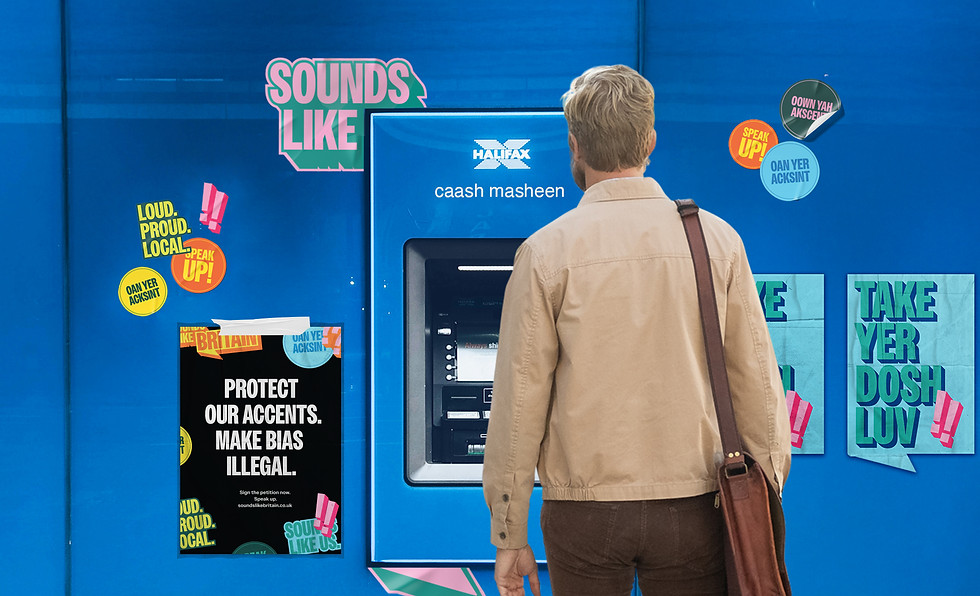Sounds Like Britain
Over the last decade, there has been a sharp fall in the proportion who take pride in Britain’s achievements. This brief asked to identify a specific British tribe and use this audience as a foundation to build a national identity to unite the kingdom.
Timeline: 01/25 - 05/25
Project type: Campaign
Brief: 'Brand Britain', WMH&I


Helping a divided nation.
This project was developed in response to WHM&I’s ‘Brand Britain’ brief, which asked designers to develop a unifying identity for the UK in a time when national pride has sharply declined.
I have made Sounds Like Britain, a campaign that celebrates the diversity of regional accents across the UK, aiming to challenge the social stigma often associated with them.
Problem
Recent research shows that pride in British identity is declining. “Britishness” now feels outdated to many. Political events such as Brexit and disatisfaction with the government, alongside rising awareness of inequality, systemic racism, colonial legacies and climate inaction all have contributed to this decline, particulary with Gen Z.


Proposal
My proposal to solve these issues is ‘Sounds Like Britain’, a campaign that challenges accent stigma by making regional voices visible through typography and interactive installations. It invites people to take pride in their speech and helps build a more inclusive, accent positive culture.
Stage one:
The first stage of the campaign is to replace conventional signage or received pronunciation speech with phonetic spellings of local accents and more diverse UK voices, making the accents themselves visible. This approach challenges the bias that certain accents, like RP, are the standard of professionalism while others are unfairly stigmatised.



Stage two:
For the second stage of the campaign, I imagined a world where regional accents aren’t just accepted, but instead they’re embedded into everyday tech. Next shows some stills from a video showing what it would be like if Siri or Google Maps responded in different UK accents. It’s a playful but powerful way to challenge the idea that only RP is “neutral” or “professional.” To support the idea of everyday integration I’ve created accent pride stickers and badges.



Stage three:
The third stage of the campaign is through an installation. This is a mirrored room that would travel to cities across the UK. When someone walks in and speaks, their words are projected onto the walls, written out phonetically in their own accent. The mirrors reflect and repeat their voice visually, so it feels like their accent is filling the whole space.



Geordie translator
To try this idea, I coded a ‘Geordie translator’ that takes what people say and writes it out in a Newcastle accent. I tested this with target users, and let the audience in pitch presentations try it out.
Try it yourself! Speak, wait and watch.
To try this code please visit: https://editor.p5js.org/epic_ams/full/tmitq2lTU
or click on the image.
Stage four:
The final stage is through social media, to bring the campaign into even more day-to-day spaces. I’ve made a Snapchat filter and set up social pages for the campaign.
The filter lets people record themselves speaking and see their words pop up on screen in their accent, just like the installation, but right on their phone. It’s a way to make the idea more shareable and playful.





